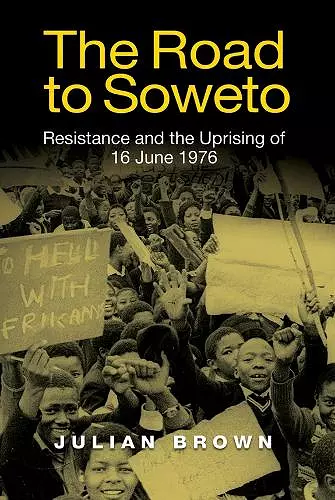The Road to Soweto
Resistance and the Uprising of 16 June 1976
Format:Paperback
Publisher:James Currey
Published:4th Sep '23
Currently unavailable, and unfortunately no date known when it will be back
This paperback is available in another edition too:
- Hardback£45.00(9781847011411)

A new history of the 1976 Soweto Uprising and the events leading to it in the preceding decade, that will transform our understanding of the historical evolution of the struggle against apartheid. This revisionary account of the Soweto Uprising of June 1976 and the decade preceding it transforms our understanding of what led to this crucial flashpoint of South Africa's history. Brown argues that far from there being "quiescence" following the Sharpeville Massacre and the suppression of African opposition movements, during which they went underground, this period was marked by experiments in resistance and attempts to develop new forms of politics that prepared the ground for the Uprising. Students at South Africa's segregated universities began to re-organise themselves as a political force; new ideas about race reinvigorated political thought; debates around confrontation shaped the development of new forms of protest. The protest then began to move off university campuses and onto the streets: through the independent actions of workers in Durban, and attempts by students to link their struggles with a broader agenda. These actions made protest public once again, and helped establish the patterns of popular action and state response that would come to shape the events in Soweto on 16 June 1976. Julian Brown is a Lecturer in the Department of Political Studies at the University of the Witwatersrand, Johannesburg. Southern Africa (South Africa, Namibia, Lesotho, Swaziland & Botswana): Jacana 'throws new light on the background to the Soweto Uprising, providing insight into white and black student politics, worker protest and broader dissent' - William Beinart, University of Oxford 'an extremely important contribution to the historiography on protest in South Africa. It links black and white student protests (too often studied in isolation from one another) to workers' movements by looking at the changing forms of protest during the 1960s and 1970s, and the apartheid government's changing responses.' - Anne Heffernan, University of the Witwatersrand 'By showing how the Soweto Uprising served as a precursor for later historical and political events, the author convincingly shows the continuity from one from one protest and decade to the next.' - Dawne Curry, University of Nebraska-Lincoln
Julian Brown's analysis of the pre-history of the Soweto uprising seeks to break new ground. * ENGLISH HISTORICAL REVIEW *
Julian Brown's thoughtful book is chock-full of insights while still under 200 pages of text. Important in its own right, a study on student and mass protest in South Africa could not be timelier. On the fortieth anniversary of the legendary Uprising, yet again South Africa finds itself bitterly divided over a student protest movement exploding onto the scene. Brown's book deserves receives wide readership for these reasons and more. * SOUTH AFRICAN HISTORICAL JOURNAL *
The strength of Brown's book is that it encapsulates the long build-up of unrest in the black community. He carefully describes the range of events that led to a growing sense of frustration and anger...Situating the uprising in this context is a powerful corrective to previous attempts to consider it in relative isolation. * TIMES LITERARY SUPPLEMENT *
The Road to Soweto is an important, moving, and encouraging book, which revises our understanding of crucial decades of South African history, and puts forward an argument that both emerges from and explains that story. -- African Studies Quarterly
ISBN: 9781847013484
Dimensions: unknown
Weight: 331g
216 pages